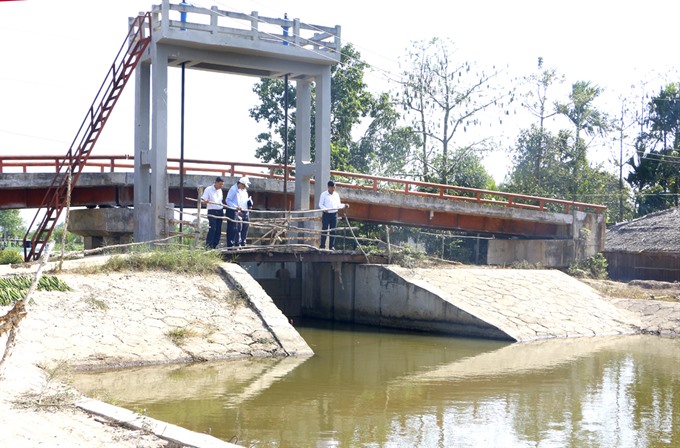 Economy
Economy

The nation should aim at secure, sustained financing of the State Budget for the next five years by reducing deficits, increasing spending efficiency and tackling tax fraud, a new Politburo Resolution says.
 |
| A sewage system in Hậu Giang Province built to protect farm land from saline intrusion. The province has invested more than VNĐ100 billion (US$4.44 million) from its state budget to cope with climate change. — VNA/VNS Photo Huỳnh Sử |
HÀ NỘI — The nation should aim at secure, sustained financing of the State Budget for the next five years by reducing deficits, increasing spending efficiency and tackling tax fraud, a new Politburo Resolution says.
The Resolution (No 07-NQ/TW) sets several specific targets based on revenue and expenditure estimates.
It says State Budget revenues are set to account for 20-21 per cent of the gross domestic product (GDP) in 2016-2020, or 1.65 times the average rate recorded over the last five years.
The revenue from domestic sources is expected to represent 84-85 per cent of the total, with crude oil and import-export making up 14-16 per cent.
Budget spending is estimated at 24-25 per cent of GDP during the ongoing five-year plan period. Regular expenditure is to make up less than 64 per cent of total spending, and capital expenditure for 25-26 per cent.
Overspending should be kept to below 4 per cent of GDP by 2020, and 3 per cent of GDP by 2030, the Resolution says.
It also says that between now and 2020, annual public debt should reach no more than 65 per cent of GDP. Government debt and foreign debt should account for a maximum of 55 per cent and 50 per cent of the GDP, respectively. The corresponding caps for 2030 are 60 per cent, 50 per cent and 45 per cent.
The Resolution says that over the last few years, Việt Nam’s budget and public debt policies have significantly contributed to socio-economic development and sped up the nation’s global economic integration process.
The legal framework for budget and public debt management has been made more transparent and closer to international standards.
However, budget collection is declining rapidly in correlation with GDP growth, public properties are being used inefficiently and tax fraud remains widely prevalent, the Resolution says.
It notes that spending demand is increasing while the spending structure remains “unreasonable”. Regular expenses are rising as capital investments fall, and many localities are not able to balance their budgets.
National responsibility to repay debts is also increasing rapidly with greater short-term payment pressures, and public investments are still inefficient.
These shortcomings are mainly due to “subjective reasons”, the Resolution says.
State Budget and public debt management policies are still inconsistent, and have not been reformed drastically to meet practical demands.
Weaknesses remain in tax and fee management systems, and prices of many essential public goods and services have not followed market principles.
There is a lack of financial discipline, and reform of non-productive areas has been very slow.
Social welfare programmes and wage reforms are necessary, but they also hike regular expense.
Budget restructuring and more effective public debt management are needed to help Việt Nam use financial resources more efficiently, foster socio-economic development and step up global integration, the R esolution says.
It says budget restructuring and debt management must be in line with economic rationalisation and renewing the growth model, with practising thrift deemed a top national policy.
Ministries, sectors and localities should be active and creative in attracting funding from diverse sectors, and authorities at all levels should publicise budget collection and spending in a transparent manner, the Resolution says.
The country must develop a socialism-oriented market economy to facilitate socio-economic progress, which will generate steady revenues for the State budget.
It must enhance productivity, efficiency and competitiveness of the economy; and harmonise monetary and fiscal policies to control inflation, stabilise the macro-economy and foster GDP growth.
It must let rates of public utilities, electricity, water, land and other important resources fully follow market rules soon.
Authorities, businesses and the general public should be more aware of the responsibility to pay taxes and fight corruption, while the country builds medium-term financial plans in line with strategies to manage public debt, budget overspending and public investments.
An advantageous and equitable business environment is needed to encourage investments and regulate incomes reasonably, the Resolution says.
It says the country will gradually reduce regular spending and increase capital investments, besides strongly reforming public non-productive units by trimming their staff and promoting financial self-control.
Public debt should be closely monitored to prevent funds from flowing into investment projects with low or unclear socio-economic efficiency. Government-guaranteed loans should also be restricted, the Resolution says.
It says State Budget funding will be concentrated on key projects relevant to national development.
The country will speed up reorganising State-owned enterprises by equitising them and asking them to withdraw capital from non-core business areas, and take tough measures to deal with bad debts and fragile credit institutions.
The Resolution calls for greater accountability from authorities who have to explain clearly the use of the State budget and public debt, and for intensified supervision to fight tax evasion.
Financial staff should continue to receive training towards enhancing their capacity to forecast and make budget and public debt management more effective.
Completing the legal framework and properly combining monetary and fiscal policies will also be part of the national strategy to manage the State Budget and public debt after 2020, the Resolution says. – VNS




